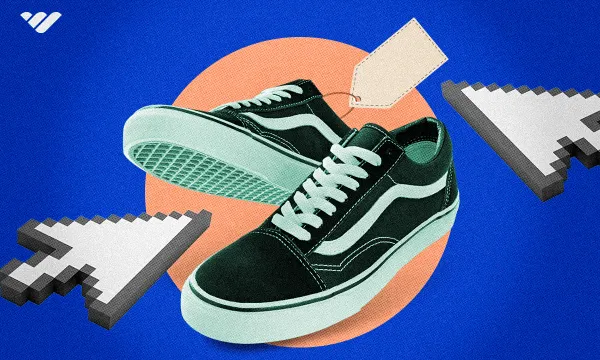Starting a new online business comes with its fair share of challenges, but the biggest one is certainly choosing where to start your online business. In other words, where will you get the most traffic (customers)?
There are several sales platforms with different features, and if you’re looking to start a specific business—like selling shoes online—choosing the right marketplace can be the difference between making money or not.
If you are, or want to be, in the business of selling shoes online, then this article is perfect for you. Keep reading and learn tips for starting an online shoe store, how to market your business, and of course, the best websites to sell shoes online.
Why Sell Shoes Online?
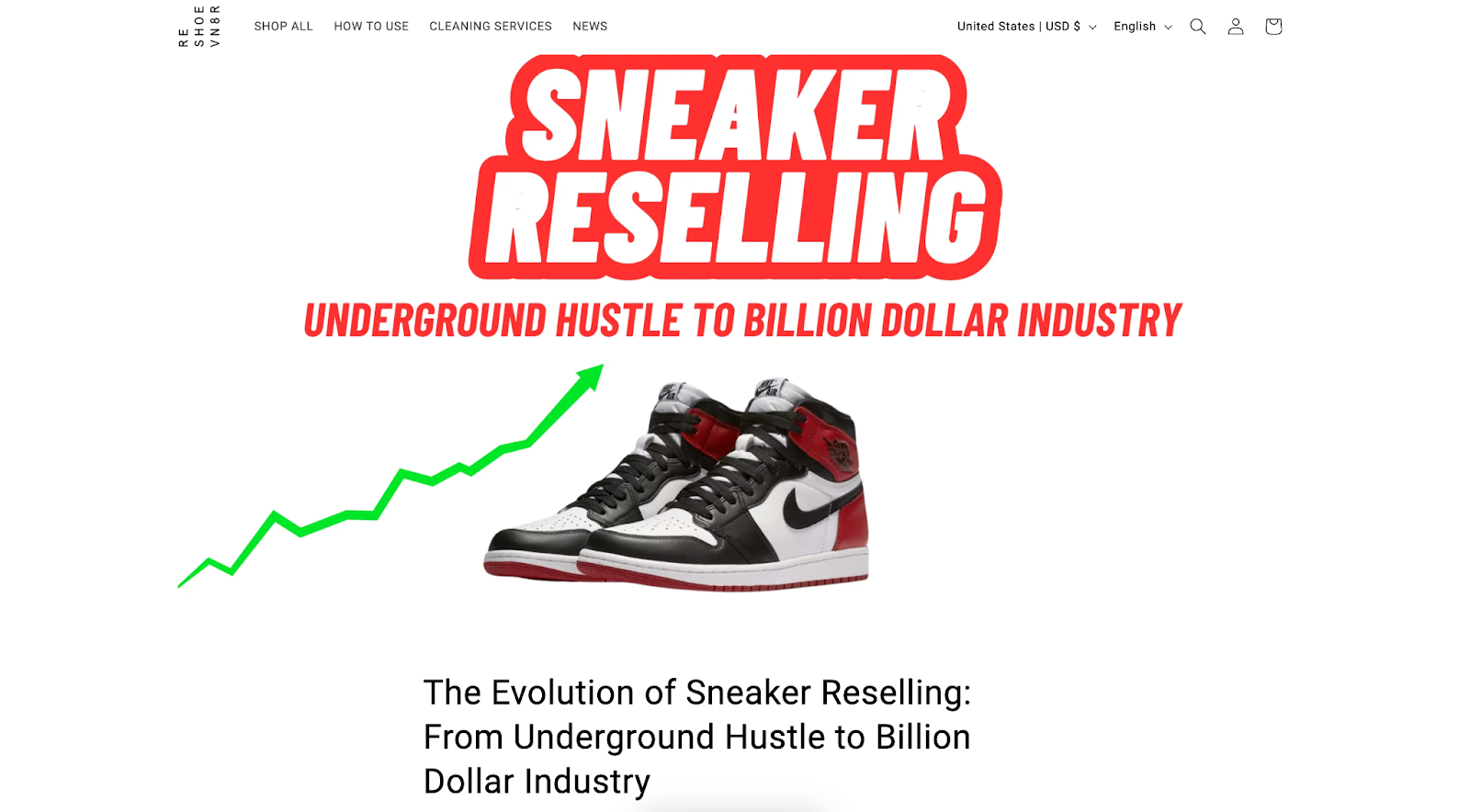
Whether it’s athletic shoes, formal shoes, or sneakers, footwear is a product that never ceases to be popular among consumers. A wider variety of options and better prices have also led buyers to choose to buy shoes online, significantly increasing demand and making the business model very profitable. Let's talk in detail about the reasons why you should consider selling shoes online:
Huge market demand
Shoes are a necessity and there’s a consistent demand for different types—from casual sneakers to formal wear. The global footwear market is massive, with billions of pairs sold annually, and there’s even a strong community of sneaker collectors who buy rare pairs just to showcase. So, by selling online, you’re tapping into this broad and growing market, making it easier to reach customers looking for various shoe styles.
Lower overhead costs
When selling shoes online, especially through dropshipping or a direct-to-consumer model using platforms like Facebook Marketplace, overhead costs are generally lower than running a brick-and-mortar store. You don’t need to worry about resting space, staffing a physical location, or managing large inventories upfront.
Wide range of niches
As stated before, shoes come in a wide variety of styles, including running shoes, boots, sandals, dress shoes, and more. With this variety, you can even cater to specific niches, like eco-friendly footwear or specialized orthopedic shoes. A well-targeted niche can help you build a loyal customer base that’s looking for precisely what you offer.
Easier inventory management
Compared to other types of products, shoes are relatively straightforward in terms of inventory management. Sizes and colors are generally the only variations, allowing you to predict inventory needs more accurately. And if you opt for a dropshipping model, you don’t even have to handle inventory directly, simplifying the logistics even more.
How Do I Start Selling Shoes Online?
Starting an online shoe business involves some steps, some of the key steps you need to take are:
Choose a niche
Identify the specific niche within the shoe market to target. It could be anything from athletic shoes, eco-friendly footwear, designer shoes, custom-made shoes, or shoes for specific demographics like kids or seniors. Picking a niche helps you stand out in a competitive market and allows you to focus your marketing efforts more effectively.
Source your products
You’ll most likely be reselling popular shoe brands like Nike, Jordan, Adidas, and more. For that, you’ll find the most success buying them directly from the manufacturer or through retail stores like Foot Locker and Champs.
But if you’re a bit more advanced, you could make your own shoes, source them from wholesalers, or use a dropshipping model where you sell shoes from suppliers who handle inventory and shipping. So consider these options when selling online:
- Wholesalers: Buy shoes in bulk and sell them at a markup.
- Private Labeling: Have shoes manufactured under your own brand name.
- Dropshipping: Partner with a supplier who ships products directly to your customers. Each sourcing option has its pros and cons, depending on your budget and business model.
Choose the best sales platform
You can create your online store by building your own website, integrating it with ecommerce platforms like Shopify or BigCommerce, or listing your products on a marketplace (which is the main topic of this article and which we’ll cover later on).
Set competitive prices
Determine competitive pricing by researching your competitors and considering your costs. Factor in shipping fees, packaging, and potential discounts when setting prices. You’ll also need clear shipping policies that specify delivery times, costs, and return processes. Consider offering free shipping or discounted rates to attract more customers.
Develop a marketing strategy for your business
Promoting your business is vital to ensuring that your online store gains visibility and builds a loyal customer base. There are many strategies you can take to market an online shoe business, the main ones being:
- Social Media Marketing: Use platforms like Instagram, Facebook, and Pinterest to showcase your products, run promotions, and engage with customers.
- Search Engine Optimization (SEO): Optimize your website for search engines or marketplaces by using relevant keywords, creating engaging content, and building backlinks. This will help increase your store’s visibility in search results.
- Influencer Partnerships: Collaborate with influencers who have a strong following in the fashion or footwear space to promote your shoes.
- Email Marketing: Build an email list and send regular updates, promotions, and new product announcements to your subscribers.
Implement customer support
Provide excellent customer service to build trust and loyalty. You can offer multiple ways for your customers to get in touch, such as live chat, email, or phone. Some marketplaces have integrated chats or comment features, so make sure you respond as quickly as possible. Implementing an easy return policy also gives customers peace of mind when purchasing shoes online.
Measure and optimize
Use analytics tools to track trends, customer behavior, and sales performance. This can help you understand what marketing strategies are working and where you can improve. A good thing is to regularly test different strategies, product offerings, and promotions to see what resonates with your audience.
The Best Sites for Selling Shoes Online
When selling online, choosing the right platform is very important, both for the features it offers and for the chances of your listings being found by the right audience. Here are some of the best websites to sell shoes online.
1. eBay

One of the largest and most established online marketplaces, eBay offers sellers access to a global audience. It's a versatile platform where you can sell everything from new sneakers to rare vintage shoes.
eBay’s auction feature also allows you to create competitive bidding for unique or high-demand shoes, helping sellers maximize their profits. The platform’s massive reach makes it ideal for selling both common and niche shoe types, such as limited-edition sneakers or designer footwear.
Pros:
- Global audience
- Auction and fixed-price listings
- Extensive seller protection policies
Cons:
- High competition
- Seller fees can add up
Pricing: eBay charges differently for products, but for sneakers under $150, the fees are 13.25% final value fee for non-store and starter subscribers. 12.35% final value fee for basic and above-store subscribers.
2. Depop
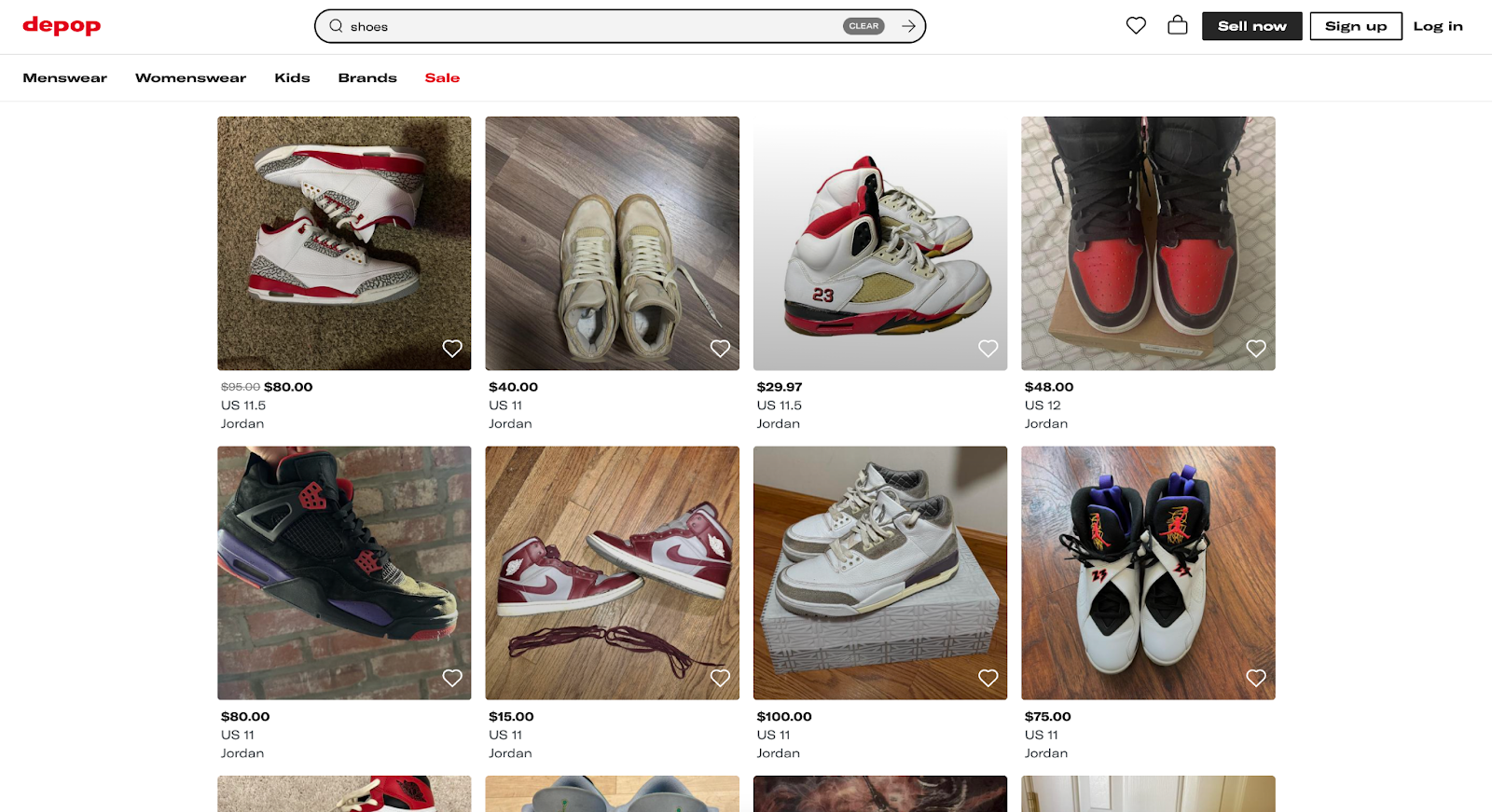
A growing marketplace with a strong focus on fashion and youth culture, Depop it’s particularly popular among younger audiences, making it an excellent platform to sell fashionable shoes, streetwear, custom sneakers, and vintage styles.
Depop allows you to create a personalized store with a social media-style interface, and it’s known for fostering a community-driven shopping experience. Sellers can interact directly with buyers, making it more personal and interactive. Despite that, Depop has fairly limited global reach (it’s a marketplace based in the UK, only now starting to operate in the US), making it not ideal for businesses that want to sell globally.
Pros:
- Ideal for vintage and trendy fashion shoes
- Social, Instagram-like platform
- Strong community focus
Cons:
- Limited international reach compared to other platforms
Pricing: Depop takes 5% of the item purchase price, plus a fixed amount of up to $1.
3. Facebook Marketplace
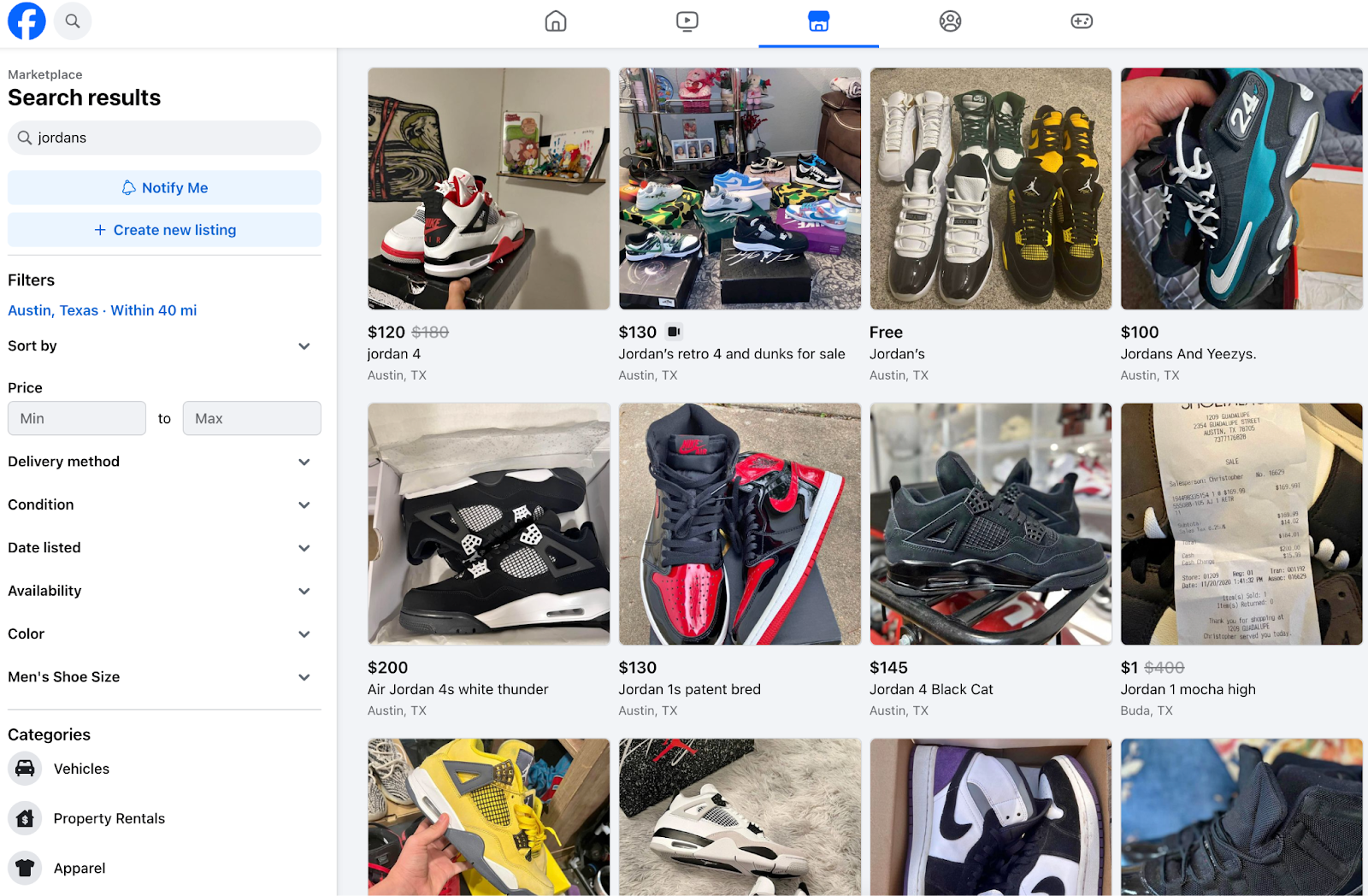
Facebook Marketplace is a free platform that lets you sell shoes to people in your local area. It’s an excellent option for quick, no-cost sales. Sellers can also reach potential buyers by promoting their listings in local buy/sell groups.
The platform is simple to use and is integrated with Facebook, making it easy to connect with buyers through Messenger. A drawback is the fact there are limited shipping options. Being a “peer-to-peer” platform, all transactions and shipping details need to be discussed between buyers and sellers. This model is also prone to scams.
Pros:
- Free to list
- Large, active user base
- Easy communication through Messenger
Cons:
- Limited shipping options
- Limited protections for sellers
Pricing: Facebook Marketplace charges no fees for listing, shipping services (if available in the area) are calculated based on distance and other factors.
4. Poshmark
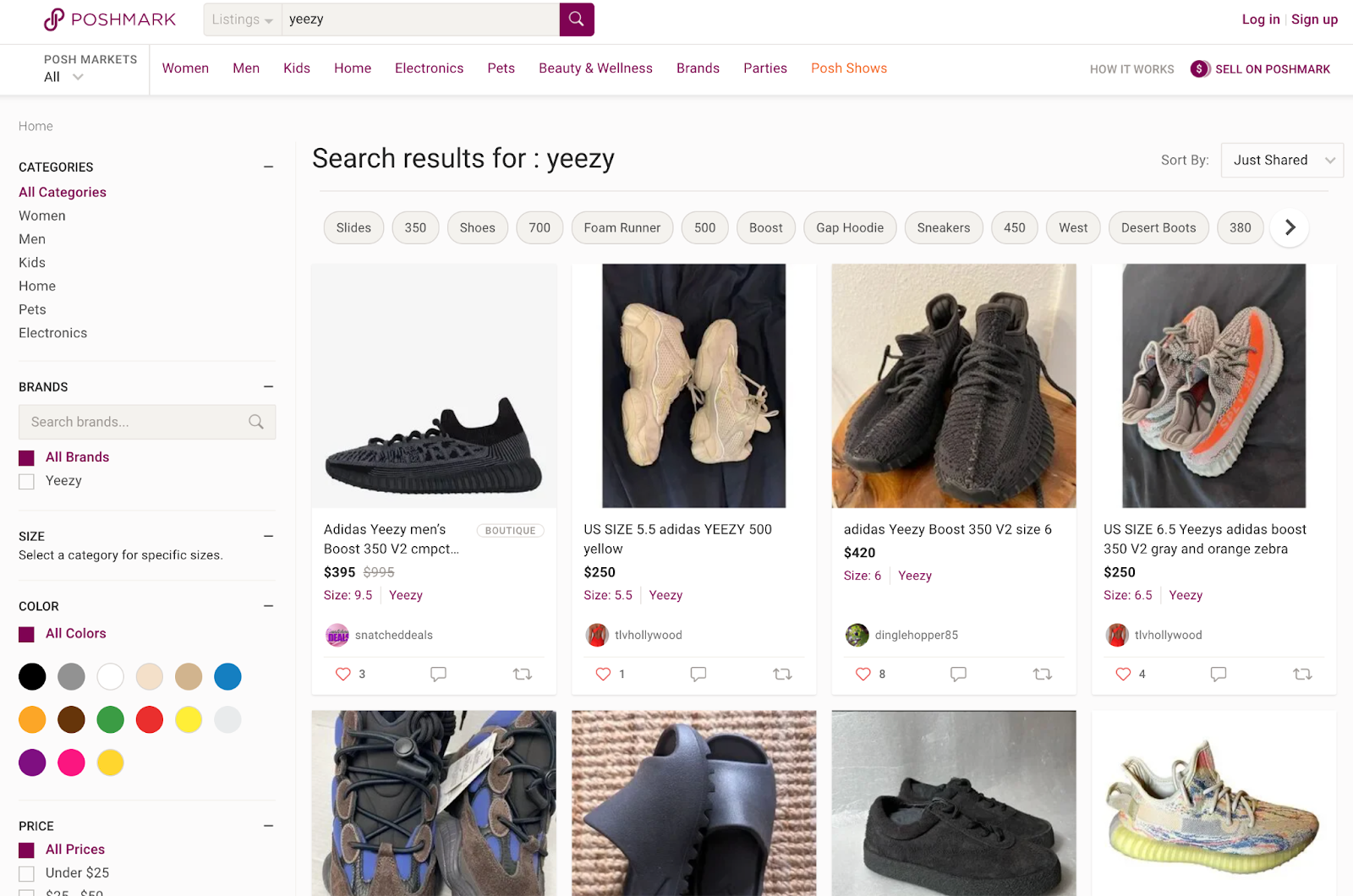
Poshmark is a fashion-centric marketplace where you can sell new and used shoes alongside clothing and accessories. It offers easy-to-use tools for listing shoes and provides a streamlined shipping process, which includes offering pre-paid shipping labels to sellers. Despite that, Poshmark’s fees can be a bit high for small vendors.
Pros:
- Easy shipping with prepaid labels
- Large audience focused on fashion
- Social features like "shares" help promote listings
Cons:
- High commission fees
- Primarily US-focused audience
Pricing: Poshmark charges a flat commission of $2.95 for sales under $15, and 20% for sales above $15.
5. Mercari
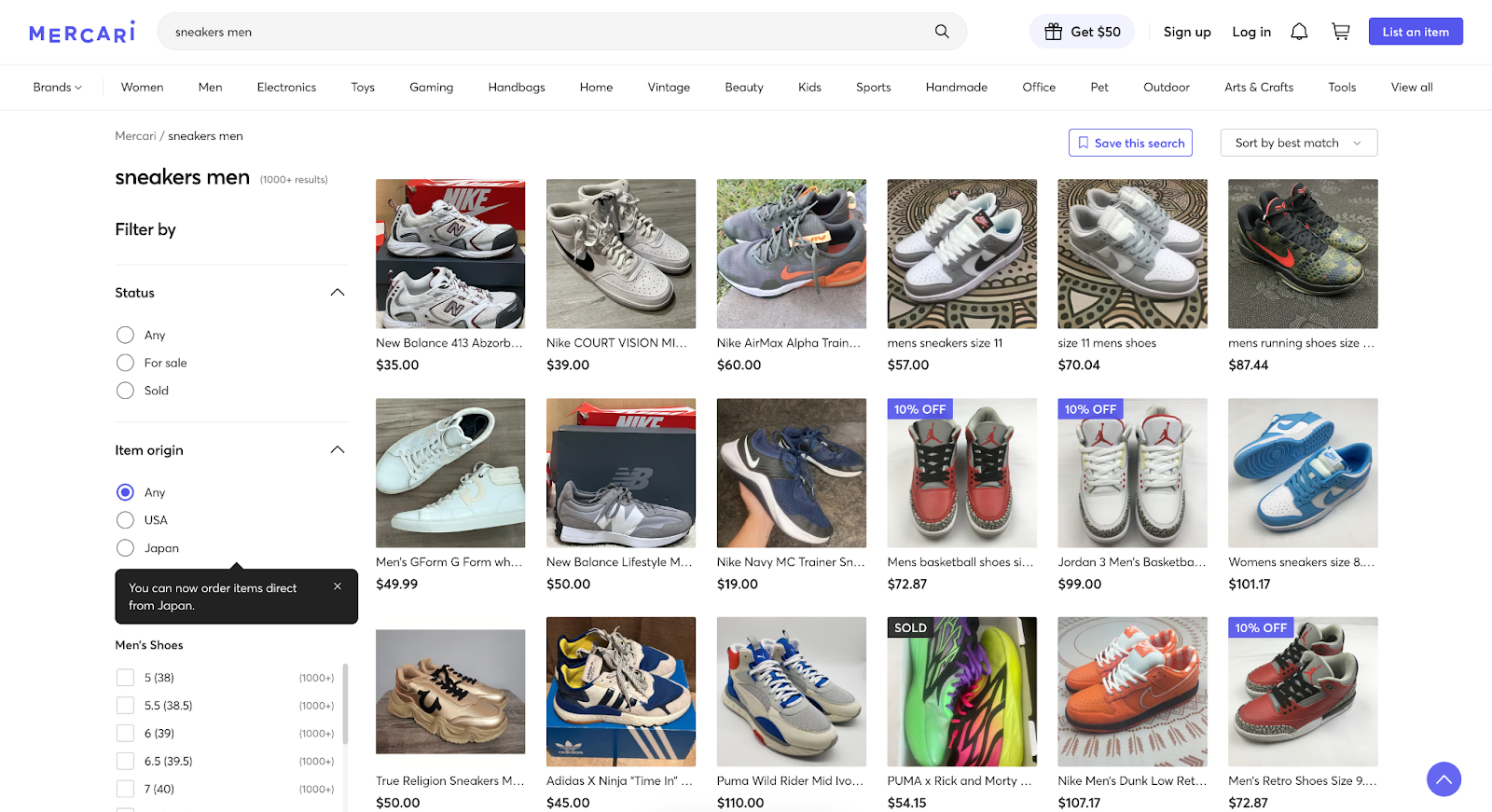
Mercari flexible marketplace for selling new or used shoes, along with a wide variety of other items. The platform is easy to use and offers lower fees than some competitors. Mercari also provides options for sellers to manage their shipping, or they can opt for prepaid shipping labels.
With its straightforward listing process, it's a good option for sellers who want to list shoes quickly. But one thing to consider is the fact Mercari is a more niche platform, focused mostly on the US, UK, and JP regions.
Pros:
- Simple to list products
- Lower fees compared to other platforms
- No listing fees
Cons:
- Limited audience compared to bigger platforms like eBay
- Only operates in the US and Japan
Pricing: Mercari doesn't have listing fees, but there’s a payment processing fee of 2.9% + $0.50 fee per item.
6. OfferUp
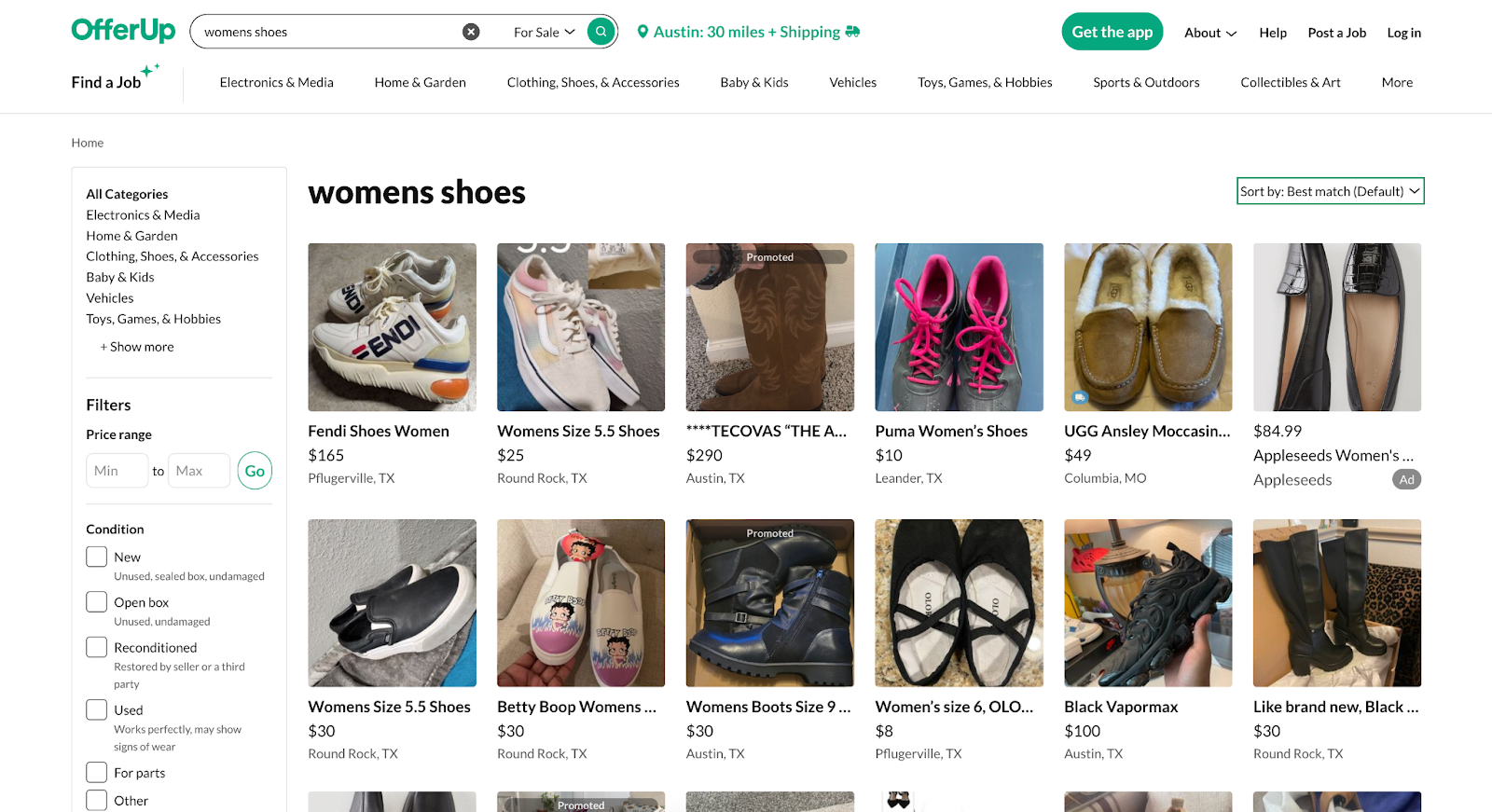
OfferUp is a C2C (customer-to-customer) marketplace primarily for buying and selling used goods, including shoes. While the platform mainly focuses on local transactions, it offers a "Shipping" feature for nationwide US sales. OfferUp allows sellers to reach local buyers easily and offers convenient features like in-app messaging to communicate with potential customers.
Pros:
- Easy local sales without shipping
- In-app messaging makes communication simple
- No listing fees
Cons:
- Smaller audience for non-local sales
Pricing: OfferUp takes a 12.9% fee on shipped items, with a minimum fee of $1.99.
7. Grailed
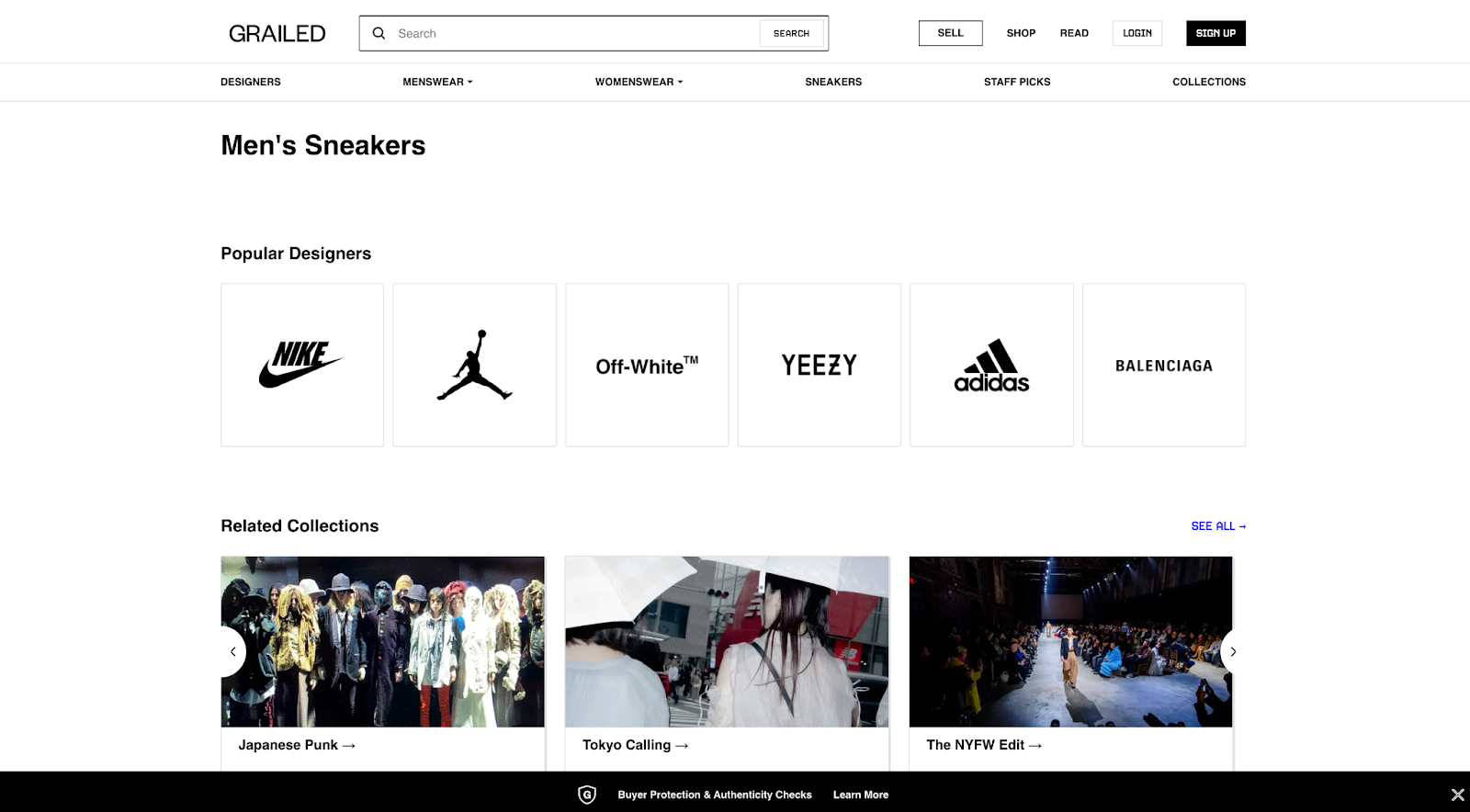
Grailed is a marketplace geared toward men’s fashion, specifically high-end streetwear and designer shoes. It’s a platform tailored for sneaker enthusiasts and fashion aficionados, making it ideal for selling luxury footwear like Yeezys, Jordans, and other limited-edition sneakers. Grailed’s community is focused on high-end shoes, and the platform has stringent authentication measures in place to prevent fraud.
Pros:
- Strong focus on high-end and streetwear shoes
- Secure authentication process for high-value shoes
- Loyal, niche audience
Cons:
- High competition in the luxury shoe segment
Pricing: Grailed charges a 9% commission, plus PayPal fees (2.9% + $0.30).
8. StockX
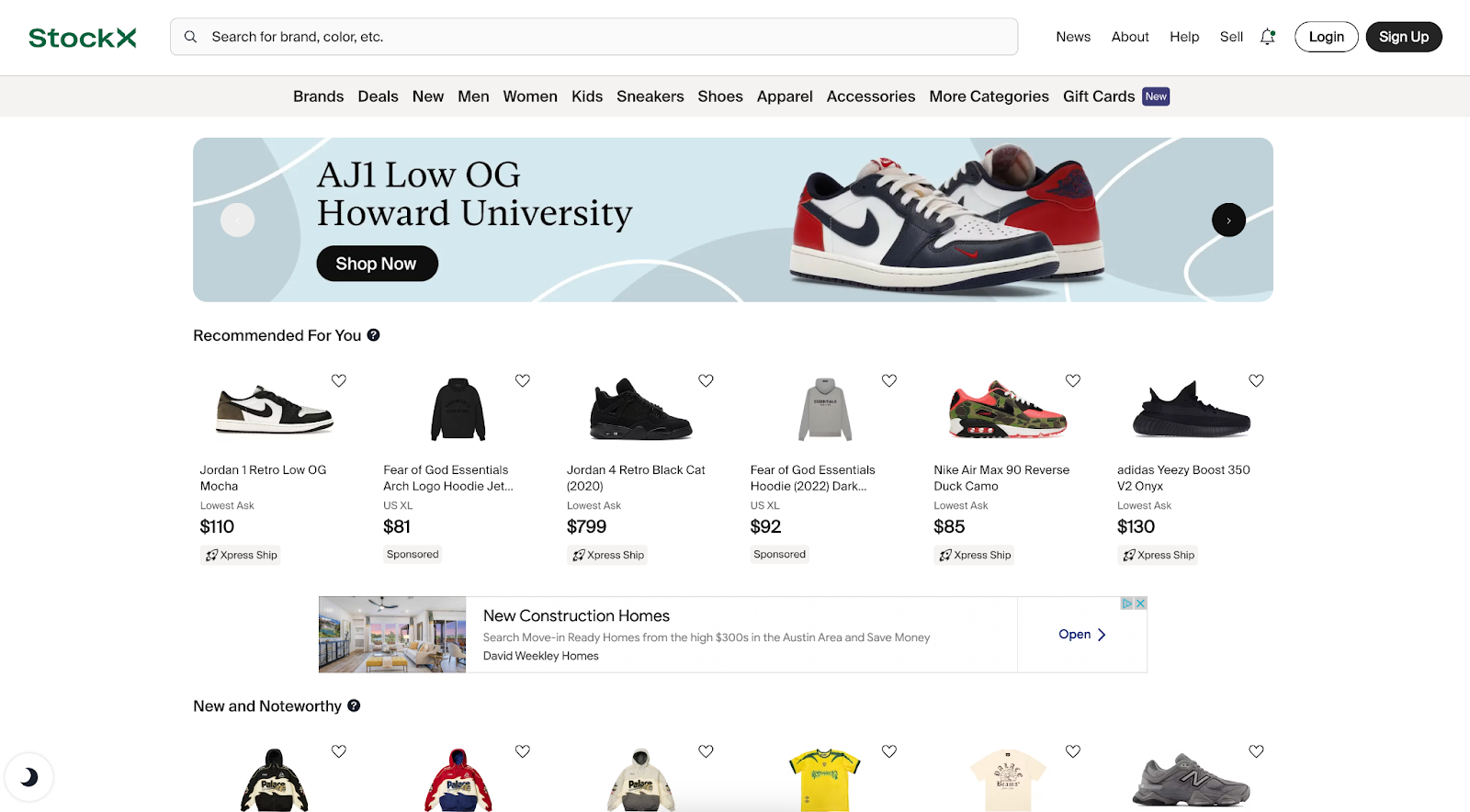
A marketplace specifically designed for reselling sneakers, streetwear, and collectibles, StockX offers a “bid and ask” system, where sellers list shoes and buyers bid on them, similar to a stock market.
It’s known for its stringent authentication process with strict selling rules, ensuring that buyers receive authentic sneakers, which makes it a trusted platform for sneakerheads. StockX is particularly strong for selling rare or limited-edition shoes.
Pros:
- Trusted authentication process
- Ideal for rare and collectible shoes
- Fair market pricing through a bid/ask system
Cons:
- Strict policies for sellers
- Fees can be high for lower-priced shoes
Pricing: StockX charges a 9% seller fee, which can decrease with higher sales volume. There’s also a 3% payment processing fee.
9. Kixify
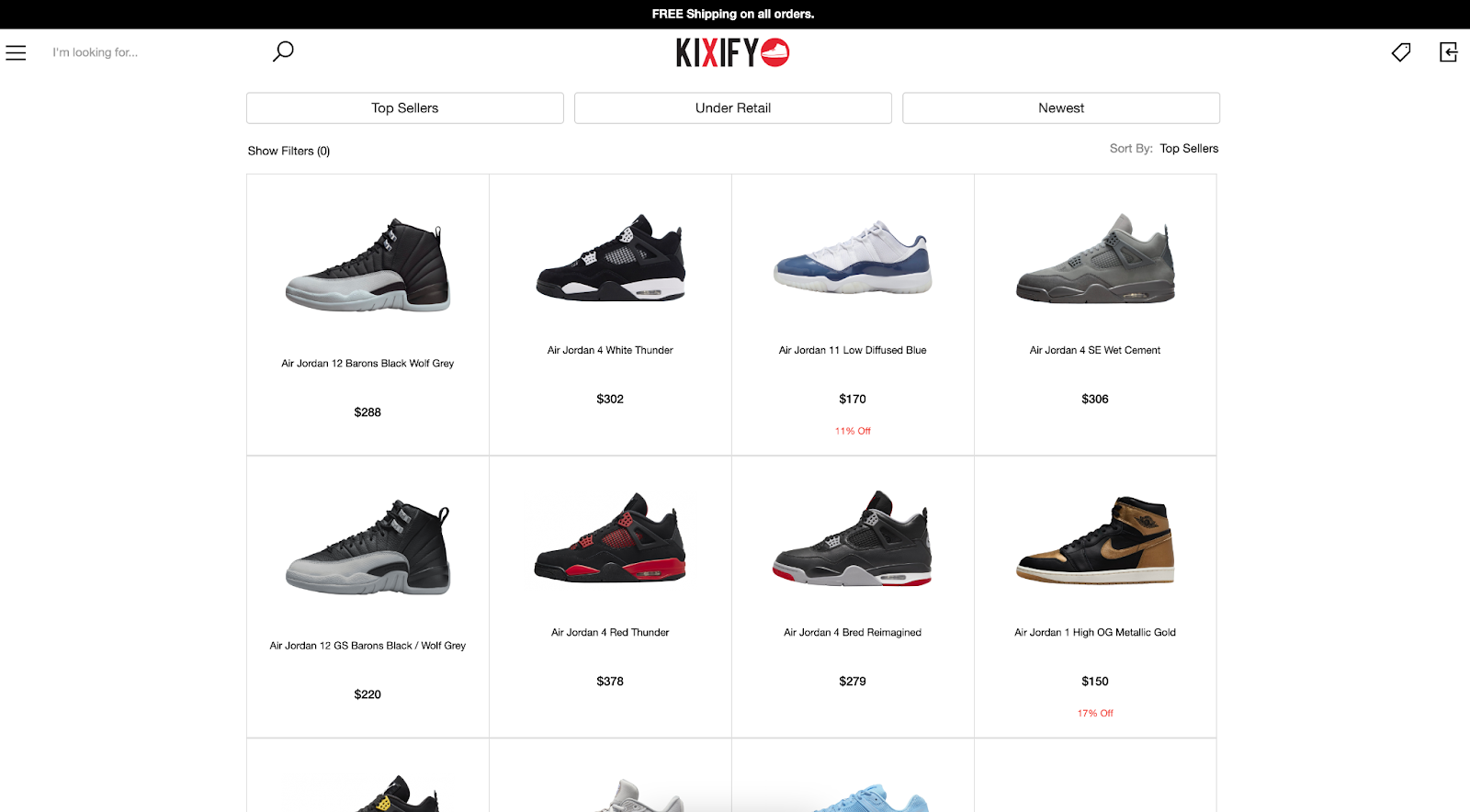
This is a marketplace exclusively dedicated to sneakers, making it an ideal platform for sneakerheads and collectors. Whether you’re selling rare, limited-edition sneakers or general athletic footwear, Kixify has a dedicated audience of buyers who are passionate about shoes. Sellers can list both new and used sneakers, with the ability to set their own prices.
Its main strength can be considered a drawback as well. As a very niche platform focused on sneakers and sneakers alone, businesses that want a more diverse catalog may not find this marketplace very attractive.
Pros:
- Niche platform focused on sneakers
- Seller sets their own prices
- Large, dedicated sneaker audience
Cons:
- Limited to sneakers, no other types of footwear
- Can be competitive for rare shoes
Pricing: Kixify has no listing fees, only taking a 10% transaction fee for each sale.
10. GOAT

GOAT is a leading marketplace for selling sneakers and high-end shoes, especially limited-edition and collectible styles. The platform is known for its authenticity checks, ensuring buyers are getting legitimate products. GOAT caters to sneaker enthusiasts and collectors, making it an ideal marketplace for sellers with rare or in-demand footwear. Despite that, the platform’s pricing can be a bit high for sellers outside the US.
Pros:
- Rigorous authentication process
- Trusted platform for rare and collectible shoes
- Large, engaged audience of sneaker fans
Cons:
- Fees can get expensive compared to other platforms
- Limited to sneakers and high-end shoes
Pricing: GOAT charges a 9.5% commission fee for sellers, plus an additional fee of up to 25% for international sellers based on their ratings on the marketplace.
11. ThredUp
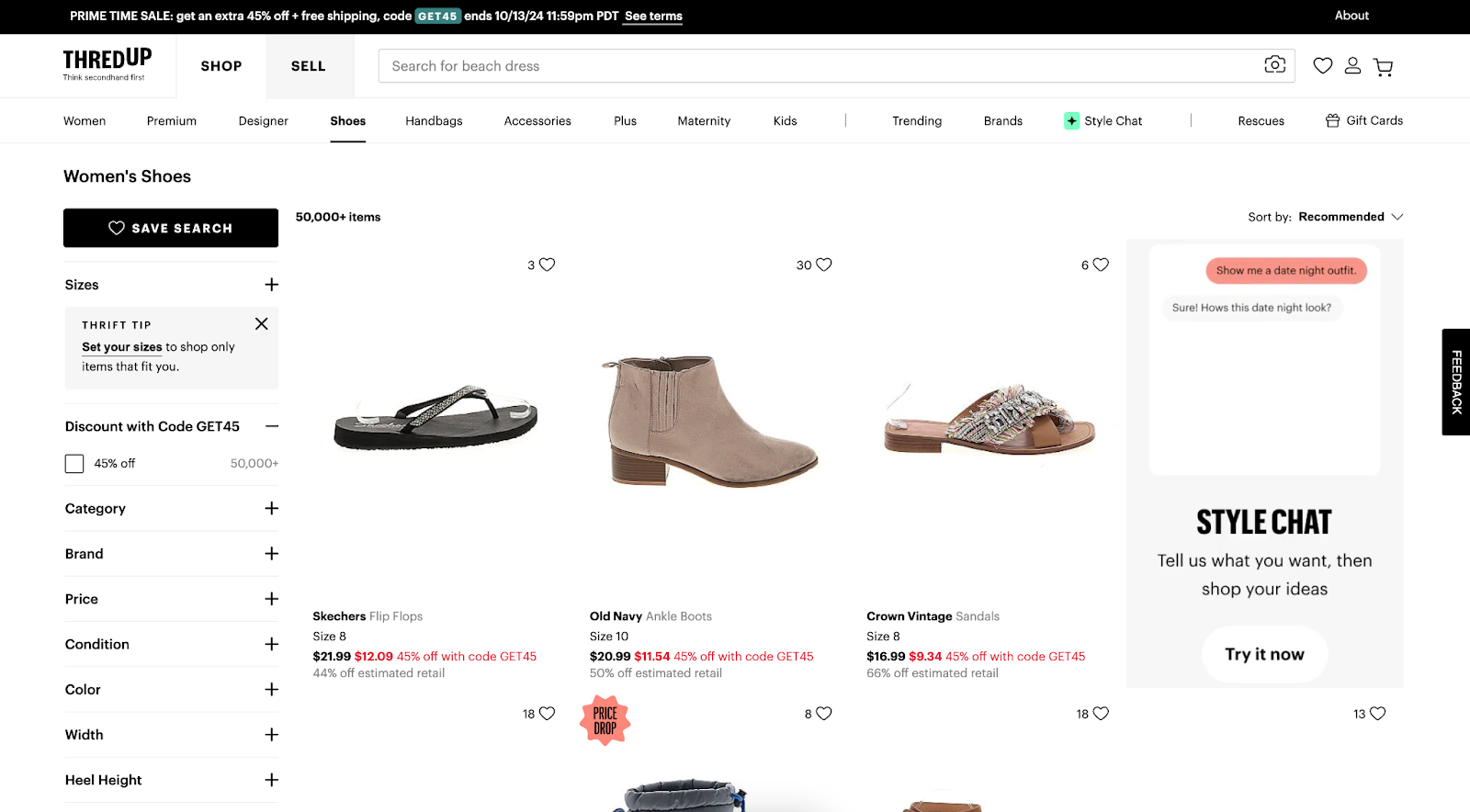
This is an ideal marketplace for selling used shoes that are still in good condition, with a hands-off approach by handling the selling process for the seller. You simply send in your items, and ThredUp list, sell, and ship them on your behalf. This makes it a great option for sellers who want to offload multiple pairs of shoes without managing individual listings.
However, ThredUp serves more as a "convenience" marketplace where you can resell used items. Another issue is that the profit margins are small, since sellers only take a small commission on items sold. Therefore, to really make a profit on ThredUp, it’s advisable to have a large amount of products available.
Pros:
- Hands-off selling process
- Environmentally conscious, secondhand marketplace
- Large customer base interested in sustainable fashion
Cons:
- Lower profit margins due to ThredUp’s payout structure
- Only accepts used items in excellent condition
Pricing: ThredUp’s payout depends on the value of the shoes. For items under $19.99, sellers earn a 3% to 15% payout; for items over $200, sellers can earn up to 80%. They also charge a $10.99 fee to return unsold items.
Want To Know How to Make Money Selling Products Online? Whop Can Show You How
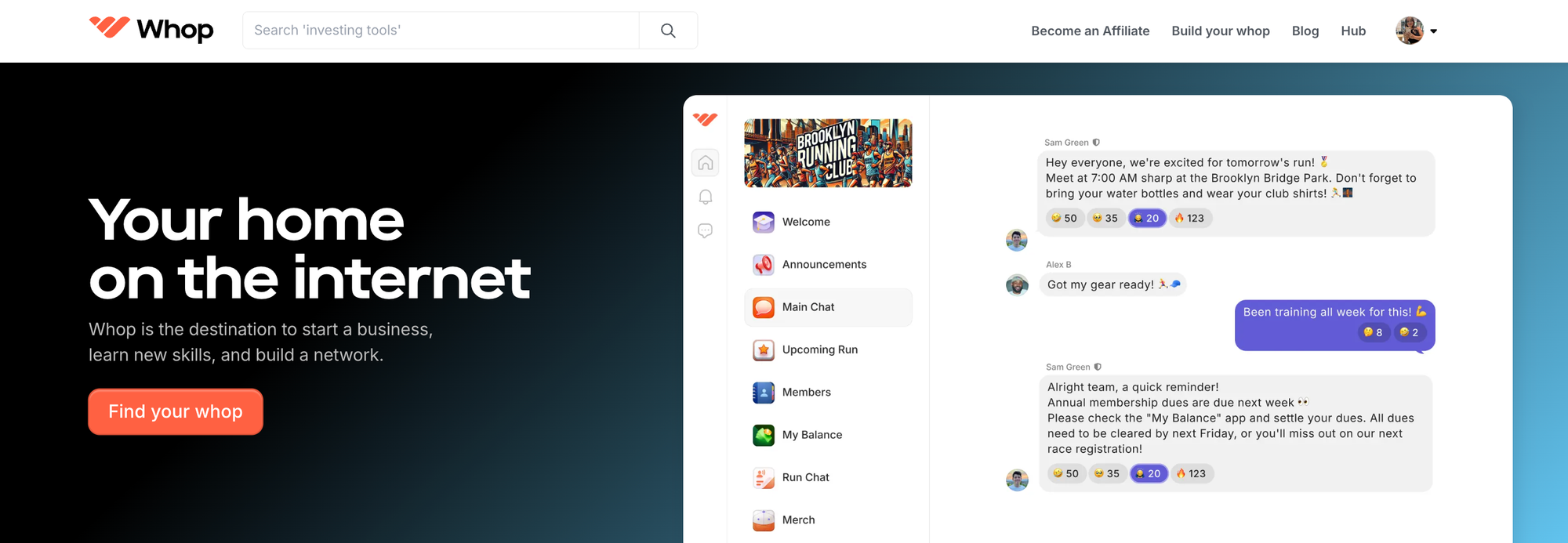
Now that you know where to sell your products, it's time to learn how to actually make money online from those who have already succeeded in ecommerce.
Whether you're looking to sell shoes, online courses, subscriptions, or any other types of digital products, the Whop Marketplace has thousands of courses and communities where you can gain insights and marketing strategies from top sellers.
It only takes a few minutes to join, what are you waiting for?
Best Sites to Sell Shoes Online FAQs
The frequently asked questions about the best sites to sell shoes online.
Can I sell both new and used shoes online?
Yes. Platforms like eBay, Poshmark, Mercari, and Depop allow you to sell both new and used shoes. It’s important to specify this information on the listings and, if the shoe is used, perfectly show all possible signs of wear in the product listing photos.
What are the risks of selling shoes online?
Common risks of selling shoes online may include disputes over authenticity and returns due to sizing issues, among others. To mitigate these, always use tracked shipping, communicate clearly with buyers, and, when selling high-end sneakers, use platforms that offer authentication services.
Why Should You Trust Us
A senior content writer at Whop, Joe Niehaus brings years of expertise in ecommerce business solutions. His knowledge has also been highlighted in renowned outlets such as Business Insider, GQ, and Travel + Leisure.
